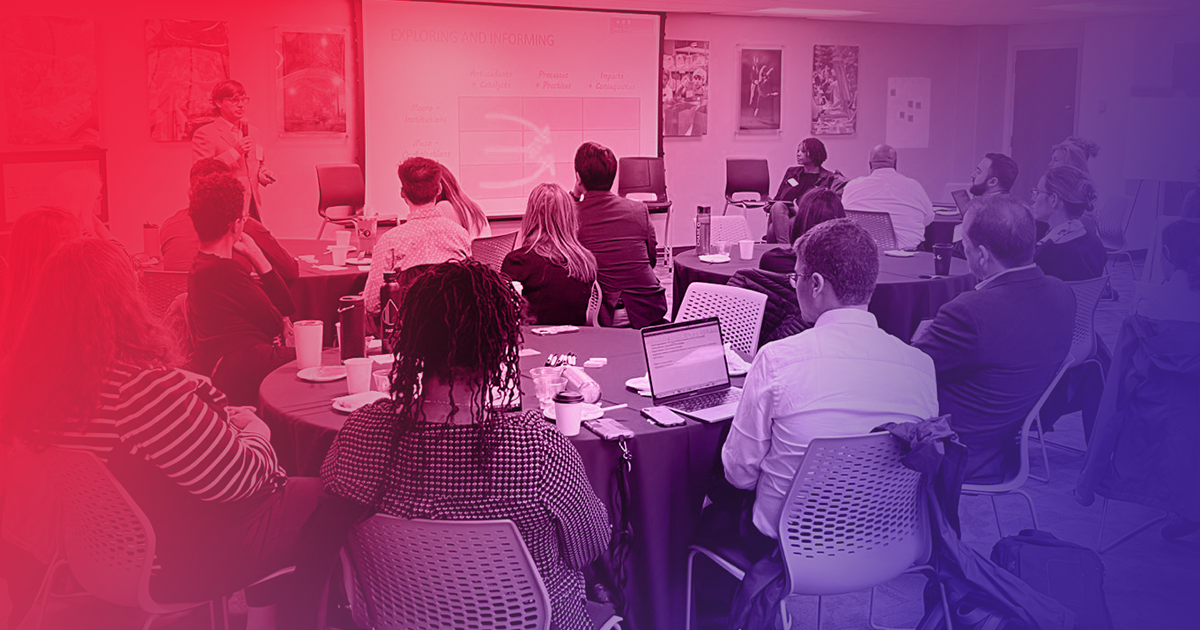
Darby Joyce
Content Marketing Coordinator
Sustainability initiatives are more integral than ever to business today. With consumers trying to match their shopping habits to their values and major corporations publicizing their environmental and social justice commitments, business owners and CEOs are finding that it’s time to think about how their work benefits the world beyond their bottom line.
This shift in how businesses view responsibilities to their communities led to the formation of benefit corporations, or B-Corps. Benefit corporations set themselves apart from standard corporations by building sustainability initiatives into their mission. The distinction lets them put forth a clear set of values for their stakeholders and employees, differentiates them in the public eye, and demonstrates shared interests with consumers. Currently, thirty-six states and DC formally recognize the B-Corp designation for businesses that want to declare the label.
Members of the Kogod community recently had the opportunity to learn more about what goes into a benefit corporation's responsibilities and speak directly with researchers and professionals in the field. The event, organized by Kogod professor of management Garima Sharma, saw nearly fifty representatives from current or aspiring B-Corps converge to discuss ideas, solve problems, and explore the future of sustainable business. Several Kogod faculty attended both to provide support and learn more, and one PhD student even traveled from Germany to participate in the event.
It was truly a meeting of the minds to have academics and responsible businesses in the room talking not past but with each other.”

Garima Sharma
Professor of Management, Kogod School of Business
“It was also a pleasure to collaborate with peers from other universities in the DMV area. This event was one step towards harnessing the excitement and knowledge about B-Corps here in DC,” Sharma said. She partnered with representatives from the business schools at George Washington University, the University of Maryland, Johns Hopkins University, Washington and Lee University, and Georgetown University, creating a cohort of area universities interested in furthering education on socially conscious business.
With help and representation from B-Corps research and advocacy groups B Academics, B Local Colorado, and B Lab, participants had the chance to combine research and practice, design new ways to teach corporate responsibility, and learn from each other. Researchers and professors with expertise on sustainability subjects met with business leaders who are pursuing these subjects in their work, and both groups left the event with new perspectives on how to bring B-Corps tenets into their work—and how to face the challenges of doing so.
Though businesses may run into a variety of obstacles while working toward these efforts, including costs and internal capabilities, one overlooked factor is whether employees themselves are interested in the initiatives being introduced. Professor Sharma recently published “Employee-CSR Tensions: Drivers of Employee (Dis)Engagement with Contested CSR Initiatives,” a paper documenting her and her coauthors’ research into the causes and consequences of friction between employees and their organization’s sustainability work. As corporate social responsibility (CSR) initiatives become more commonplace, it’s become even more important that employees are on board, as their involvement is vital to the success of these initiatives. However, if these employees disagree with the specific steps their employer is taking—or if they are resistant to CSR efforts as a whole—the resulting tension can stand in the way of real progress within an organization.
CSR initiatives becoming more integrated with business also means more variance in employee engagement and a higher probability of tensions.”

Garima Sharma
Professor of Management, Kogod School of Business
“No research studies have looked at this tension. Given the significance of CSR in organizations, it was an important gap to fill,” Sharma explained.
Sharma and her coauthors filled this knowledge gap by approaching CSR initiatives from the employee perspective. Though previous research has noted different ways that employees can be engaged or disengaged with their employer’s social responsibility efforts, this paper is the first to work on explaining what causes different levels of engagement. Employee involvement is rarely an on-or-off situation; even when individuals disagree with their workplace’s initiatives or approaches, they’re still likely to be involved in some capacity.
“We used paradox theory to conceptualize a mindset in which employees may see tensions as ‘both/and’ instead of ‘either/or,’ which explains their engagement with CSR initiatives even if they disagree,” Sharma said. “We also draw on paradox theory to conceptualize the type of tension—employees may disagree with the goals of CSR or the means of implementing the initiatives.”
The research found that tensions with the goals are more challenging to resolve than tensions with the means. Employees can more easily come to terms with their employers enacting an approach they disagree with if their goals are still aligned; however, CSR goals are usually based on personal ideology. Finding a solution becomes far more complicated if the tension stems from a difference in opinion on what those goals should be. As a result, organizations must pinpoint whether their problem lies in the goals or the means to best resolve these tensions.
The good news is that friction between CSR initiatives and the employees affected by them doesn’t always lead to failure. “We show that it is not simply the employee mindset or the organization’s practices that explain engagement. Rather, it’s an interaction of both with the tension type,” Sharma explained.
This interaction means that tensions are not always bad – they can be generative if the drivers are configured correctly.”

Garima Sharma
Professor of Management, Kogod School of Business
Specifically, if the tension stems from the means instead of the goals and if CSR efforts are embedded into work life instead of appearing sporadically, employees and managers alike can use that tension more productively and determine what needs to change as these efforts continue.
By exploring in depth what can slow down a successful sustainability effort, Professor Sharma and her colleagues can pave the way for businesses to navigate their initiatives better and keep everybody involved in mind. The success of the B-Corps event shows that leaders in the DC area and beyond want to create a future where business balances profit with responsibility to their employees, their communities, and the world. With these professionals making an effort to meet up and answer their most pressing questions, the stage is set for positive change.
